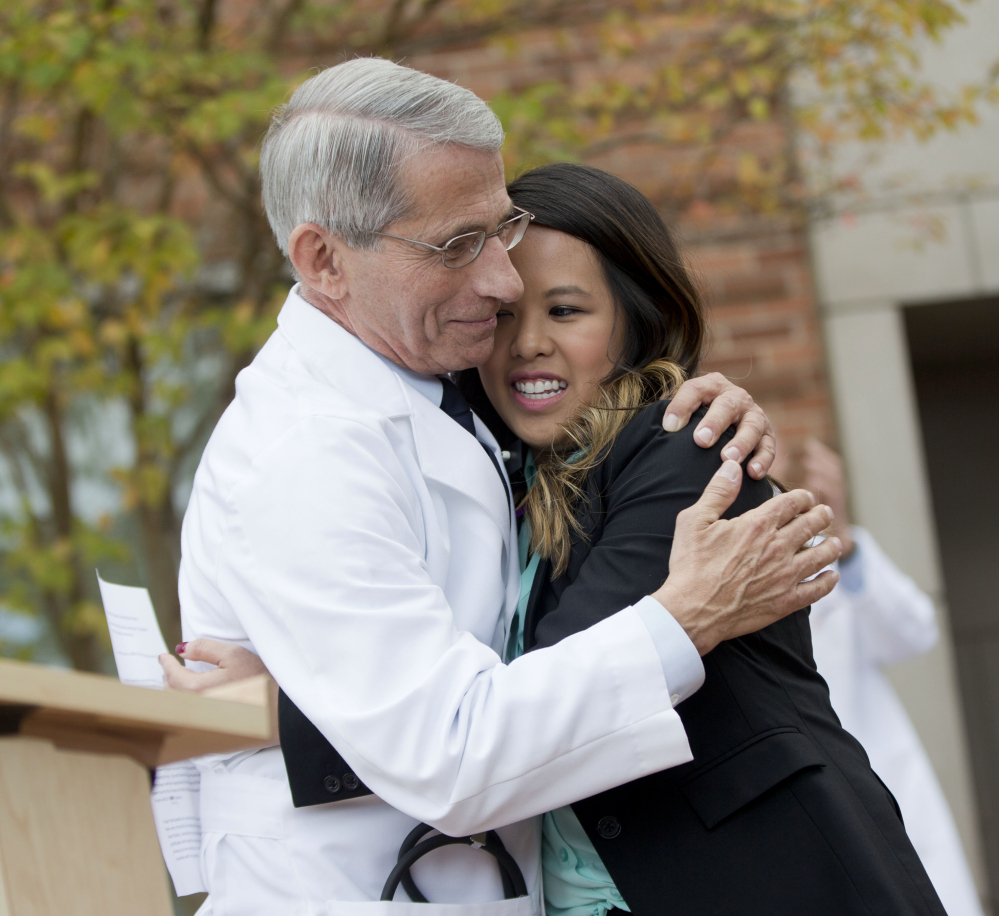NEWARK, N.J. — The federal Centers for Disease Control and Prevention recommended new restrictions Monday for people at highest risk for coming down with the Ebola virus, and symptom monitoring for those at lower risk, but some state governors and even the Army are carving their own paths.
As contradictory state policies proliferate in response to Ebola fears, the CDC’s recommendations mark an effort to create a national standard, one that would protect public health without discouraging people from helping fight its spread overseas.
The CDC now says that even if people have no symptoms and are not considered contagious, they should stay away from commercial transportation or public gatherings if they have been in direct contact with the bodily fluids of someone who is sick with Ebola – say, by touching their fluids without protective gear or by suffering an injury from a contaminated needle.
Absent that direct contact, simply caring for Ebola patients or traveling in West Africa doesn’t warrant quarantine conditions, the public health agency said.
But quarantines are determined state by state in the U.S., and the CDC is empowered only to issue guidelines. And even within the federal government, authorities were improvising Monday: An Army commander in Italy said he and his troops returning from Liberia will remain in isolation for 21 days, even though he feels they face no risk and show no symptoms. The Army’s chief of staff, Gen. Ray Odierno, directed the 21-day controlled monitoring period for all redeploying soldiers returning from the Ebola fight in West Africa, an Army spokeswoman said.
President Obama has told his Ebola team that any measures involving health care workers should be crafted to avoid unnecessarily discouraging people from responding to the outbreak. That’s already happening, Doctors Without Borders said Monday: Some medical workers are reducing their time in the field to include potential quarantines afterward.
“The best way to protect us is to stop the epidemic in Africa, and we need those health care workers, so we do not want to put them in a position where it makes it very, very uncomfortable for them to even volunteer to go,” said Dr. Anthony Fauci, director of the National Institute of Allergy and Infectious Diseases.
The governors of New York and New Jersey defended their quarantine policies as necessary precautions in dealing with a virus that already has killed nearly half the 10,000-plus people infected this year in West Africa. Maj. Gen. Darryl Williams said that the decision to isolate returning troops was taken to ensure their family members’ comfort, even though none is showing symptoms, and he does not believe any soldier under his command is at risk.
Speaking by telephone from a U.S. base in Vicenza, Italy, Williams said he and his soldiers will be living in isolation under controlled monitoring during the three weeks it takes to be sure Ebola hasn’t infected them. Williams returned to Italy Sunday with 10 soldiers with another 65 due back in two groups by Saturday.
It’s just “normal concern,” Williams said. “There was nothing elevated that triggered this increased posture.”
A senior defense official said Defense Secretary Chuck Hagel is expected to review the recommendations on Ebola but has made no decision. The official was not authorized to discuss the matter publicly so spoke on condition of anonymity. White House spokesman Josh Earnest said the Pentagon’s policy on isolating returning personnel has not been settled and implemented yet.
Also absent is any uniform response within the United States to the increasing number of people and medical volunteers returning from Ebola-stricken countries in Africa.
“The response to Ebola must not be guided primarily by panic in countries not overly affected by the epidemic,” said Sophie Delaunay, the U.S. director of Doctors Without Borders.
New York’s and New Jersey’s governors announced Friday that any health care workers returning from West Africa to their states would face mandatory 21-day quarantines. Other states including Illinois, Maryland, Minnesota and Georgia have since announced their own measures.
Some other governors, like Rhode Island Democrat Lincoln Chafee, urged his colleagues Monday to “ratchet down some of the hysteria,” since scientists have repeatedly said that people carrying the virus are not contagious until they show symptoms.
Ebola fears can have consequences beyond public health. New York City school officials warned principals to be on the lookout for bullying of West African students after two brothers from Senegal, which the World Health Organization declared Ebola-free this month, reported being taunted with chants of “Ebola.”
New York Gov. Andrew Cuomo, a Democrat, backed his Republican neighbor Christie in calling the quarantines “entirely reasonable.”
“You could say I am being overcautious,” Cuomo said. “I would rather be, in this situation, a little overcautious.”
Send questions/comments to the editors.



Success. Please wait for the page to reload. If the page does not reload within 5 seconds, please refresh the page.
Enter your email and password to access comments.
Hi, to comment on stories you must . This profile is in addition to your subscription and website login.
Already have a commenting profile? .
Invalid username/password.
Please check your email to confirm and complete your registration.
Only subscribers are eligible to post comments. Please subscribe or login first for digital access. Here’s why.
Use the form below to reset your password. When you've submitted your account email, we will send an email with a reset code.